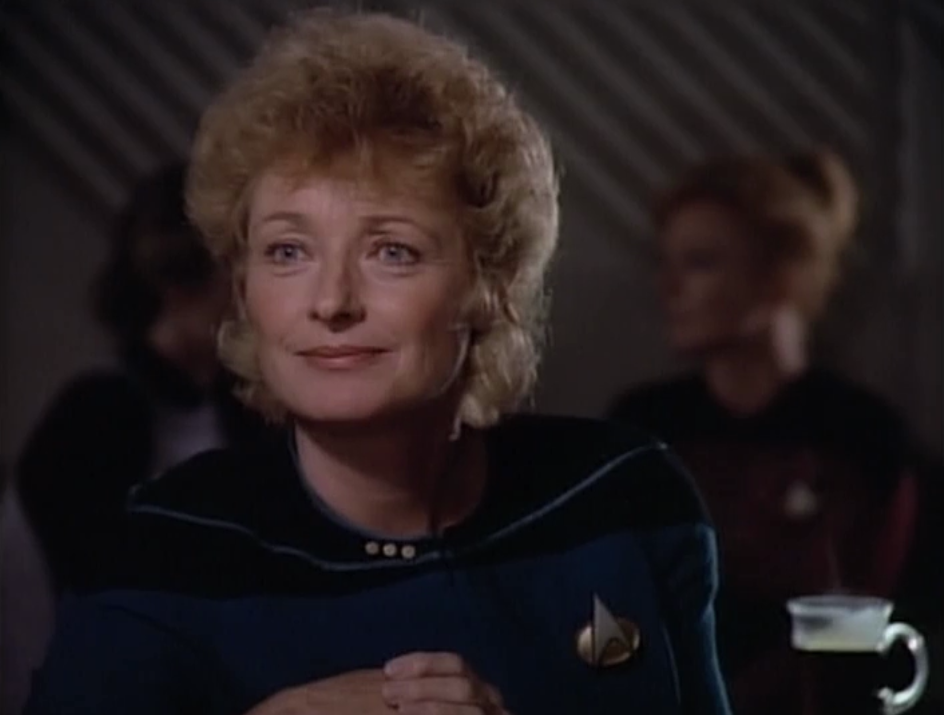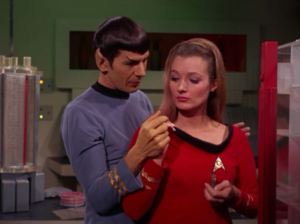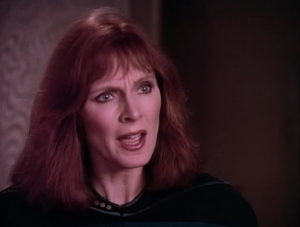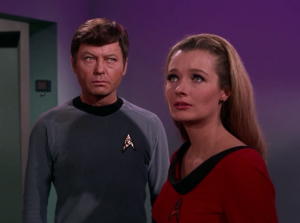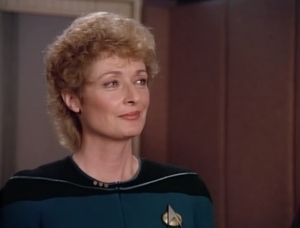I like Pulaski. It’s not that I feel bad for her because of all the hate she receives, and it’s not because I want to be a contrarian. There really is something special about the character, which we’ll discuss below.
Pulaski the “Rebel”
The very first scene for a character (especially one introduced part way through a series) can tell us a lot. In Pulaski’s first episode (The Child), 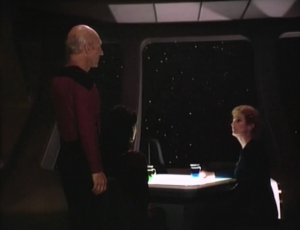 Picard and the rest of the bridge crew are surprised that Pulaski hadn’t come to the bridge to introduce herself. Picard finds out that she’s in Ten-Forward instead. Picard goes there, presumably to chew her out, and finds her discussing a sensitive matter with Troi, a matter that turns out to drive the plot of the episode. I really like this as her introduction. It’s a great way of showing that her main concern is helping people, and less with hierarchy and protocol.
Picard and the rest of the bridge crew are surprised that Pulaski hadn’t come to the bridge to introduce herself. Picard finds out that she’s in Ten-Forward instead. Picard goes there, presumably to chew her out, and finds her discussing a sensitive matter with Troi, a matter that turns out to drive the plot of the episode. I really like this as her introduction. It’s a great way of showing that her main concern is helping people, and less with hierarchy and protocol.
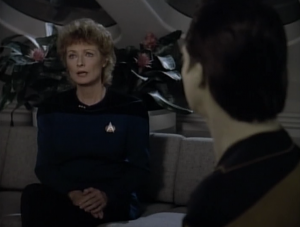 From time to time different Star Trek characters display a lack of concern for rules, but Pulaski sells this characteristic superbly. It’s perhaps best portrayed in the episode “Pen Pals” where she takes an aggressive position against the prime directive in a particular case. Most of the time, when a character doesn’t care about rules, it’s for one or two overused reasons: Either it’s supposed to signify that they’re too “cool” to be burdened with protocol, or that the character is so devoted to a friendship or love of another character that they will even break rules to help them. Pulaski is interesting because she disregards rules on purely ethical grounds, for people she has never met, in the case of “Pen Pals”, and for a person she’s just met in the case of “The Child”.
From time to time different Star Trek characters display a lack of concern for rules, but Pulaski sells this characteristic superbly. It’s perhaps best portrayed in the episode “Pen Pals” where she takes an aggressive position against the prime directive in a particular case. Most of the time, when a character doesn’t care about rules, it’s for one or two overused reasons: Either it’s supposed to signify that they’re too “cool” to be burdened with protocol, or that the character is so devoted to a friendship or love of another character that they will even break rules to help them. Pulaski is interesting because she disregards rules on purely ethical grounds, for people she has never met, in the case of “Pen Pals”, and for a person she’s just met in the case of “The Child”.
She Isn’t Afraid of Anyone
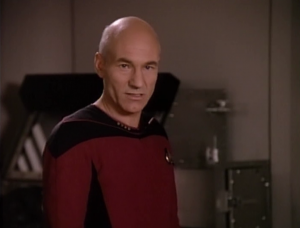 One of the themes in the first season of TNG is that Picard is intimidating. Every now and then someone stands up to him, but once again, no one sold it better than Pulaski. With her it wasn’t like there were a few instances where she stood up to him, it was consistently clear that she wasn’t afraid of him, even when they weren’t actually butting heads. Even for those who dislike the Pulaski character, it’s hard not to acknowledge that whatever Muldaur is required to do for a character, she makes it completely believable. This is something that may have actually worked against her popularity. When most characters talk back to Picard, we kind of get the feeling that Picard is just going to pity them. When Pulaski talks back to Picard, as a Picard fan, I actually feel a little threatened, because it’s so much more real. It’s mentioned in “Unatural Selection” that Picard and Pulaski really aren’t that different in some regards. I think this is probably true, and probably one of the reasons I like Pulaski. It’s cool to have a character that’s willing to stand up to anyone, and doesn’t care what anyone thinks of her.
One of the themes in the first season of TNG is that Picard is intimidating. Every now and then someone stands up to him, but once again, no one sold it better than Pulaski. With her it wasn’t like there were a few instances where she stood up to him, it was consistently clear that she wasn’t afraid of him, even when they weren’t actually butting heads. Even for those who dislike the Pulaski character, it’s hard not to acknowledge that whatever Muldaur is required to do for a character, she makes it completely believable. This is something that may have actually worked against her popularity. When most characters talk back to Picard, we kind of get the feeling that Picard is just going to pity them. When Pulaski talks back to Picard, as a Picard fan, I actually feel a little threatened, because it’s so much more real. It’s mentioned in “Unatural Selection” that Picard and Pulaski really aren’t that different in some regards. I think this is probably true, and probably one of the reasons I like Pulaski. It’s cool to have a character that’s willing to stand up to anyone, and doesn’t care what anyone thinks of her.
Pulaski Attire
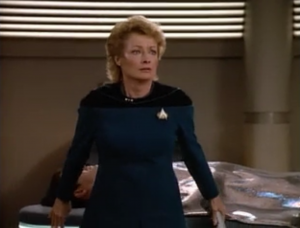 This isn’t important at all, but at this point in The Next Generation, Pulaski has the best uniform. I just thought I’d be thorough.
This isn’t important at all, but at this point in The Next Generation, Pulaski has the best uniform. I just thought I’d be thorough.
Pulaski Warmth
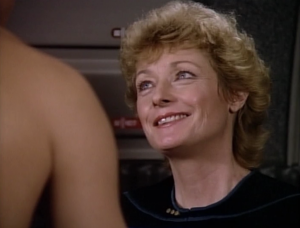 StarTrek.com had a poll asking which was the most empathetic doctor. The comments on facebook and elsewhere were filled with Pulaski hate, saying things like “Pulaski doesn’t have a shred of bedside manner.” One can argue that she isn’t empathetic in general (and I would disagree), but one can not possibly argue that she has bad bedside manner. She can be rude with Data, and blunt when discussing important ship business, but she’s always very warm to the people she’s treating. For people who doubt this, honestly just watch any episode where she has a patient. And aside from Data, most of the time that she displays what people inappropriately call a bad attitude, it’s only because other people are showing a lack of empathy (and usually she’s right).
StarTrek.com had a poll asking which was the most empathetic doctor. The comments on facebook and elsewhere were filled with Pulaski hate, saying things like “Pulaski doesn’t have a shred of bedside manner.” One can argue that she isn’t empathetic in general (and I would disagree), but one can not possibly argue that she has bad bedside manner. She can be rude with Data, and blunt when discussing important ship business, but she’s always very warm to the people she’s treating. For people who doubt this, honestly just watch any episode where she has a patient. And aside from Data, most of the time that she displays what people inappropriately call a bad attitude, it’s only because other people are showing a lack of empathy (and usually she’s right).
If you want specific examples, there are plenty. In “The Child”, Pulaski is there for Troi and her child in every possible way. When Worf is going through a ritual involving people inflicting him with pain, Pulaski can’t keep herself from helping him, and has to be held back by O’Brien. Deanna Troi, who is established primarily as a character centered around empathy, says in “The Icarus Factor” that “doctor Pulaski’s greatest medical skill is her empathy.” In this same episode, Pulaski says of her patients that “when they hurt, I hurt”, and she explains how it’s common for her to make her patients soup as they recover. In “Pen Pals”, she finds a way to be comforting towards a child that’s terrified of everyone on board (she uses the presence of Data, the one person the child trusts). These are only a few examples, but literally every patient she has, she is nothing but comforting, and warm. I challenge anyone to find one example where she’s cold to a patient.
This trait in Pulaski really brings home her motivation to care for people above all else.
The Personae
How a personae comes across to a person is something that is highly subjective, and there are people who dislike Pulaski for reasons just as vague. However this is a main reason I like Pulaski, so I should mention it, even though it will be underwhelming and completely unpersuasive to most people. It’s simply that she’s a tough, older lady, and I think that’s cool.
The presence of a character can go even further to them being likable than anything the character actually does. Muldaur has a commanding presence, and even when she was wearing completely undignified clothes in The Original Series, she still managed to have an aura of dignity.
Maybe it’s simply the way she looks, or her voice, but she automatically demands respect. Some people may say she loses a lot of respect by some of her actions, but for now I’m only talking about the innate presence that the actress displays.
Stop with the Comparisons for a Second
You don’t need to compare Pulaski to Beverly. Don’t worry, Beverly comes back in the third season. There’s no longer any reason to be bitter about her leaving. Some members of the Pulaski fan club also like to draw comparisons to Crusher, which I think is a mistake. You’re allowed to like both characters.
People also love to compare her to Bones. This isn’t unreasonable since the writers have said they wanted her to be like Bones. Some people like Pulaski because they see her as a female Bones, and some people hate her because of the likeness. I don’t think they’re that similar. Other than a few characteristics, they’re very different. The similar characteristics (making fun of the analytical character, stubbornness, being old-timey) are so generic that the characters don’t end up being all that alike. Archetypes are seen over and over again in Star Trek characters, but most of the time people still see each character as an individual. That is, unless the writers say that one character is meant to be like another character, in which case everyone will associate the two. Don’t listen to the writers. Just judge what comes across onscreen.
Her Relationship With Data
To a lot of people, especially those who dislike Pulaski, this is her most defining trait. Even though the writers may have intended it to be a big part of her character originally (once again, I don’t really care about what the writers intended), I think she pretty quickly moves past this dynamic.
The idea was that people loved the ribbing between Bones and Spock, and they wanted to recreate that with Data and another character. Instead of coming across as evenly matched banter, it seemed more like the overused sci-fi theme of “intolerance to robots.” Perhaps the main reason it didn’t really work was that there’s too much of a disconnect between Pulaski’s viewpoint and reality. She was uncomfortable with a machine officer, which is a perfectly understandable position, except that Data wasn’t really like a machine. He’s more like a socially awkward human that can read really fast and bend pipes. It made Pulaski’s viewpoint seem out of line.
Still, this aspect of her character has become perplexingly exaggerated for a lot of TNG fans. The best way to make my point is to actually go through the encounters between Data and Pulaski (hey, I said this was going to be a thorough analysis, didn’t I?).
In “The Child” Pulaski wants Troi to have a human touch by her side, and she doesn’t  think Data would be good at this. Pulaski turns out to be completely correct, and Data mainly just bothers Troi. Also in this episode Pulaski has an exchange where she doesn’t see any difference between calling Data, “day-ta” or “dah-ta”. It’s just a dumb joke about the two different pronunciations of the word, and no one would really say that about someone’s name.
think Data would be good at this. Pulaski turns out to be completely correct, and Data mainly just bothers Troi. Also in this episode Pulaski has an exchange where she doesn’t see any difference between calling Data, “day-ta” or “dah-ta”. It’s just a dumb joke about the two different pronunciations of the word, and no one would really say that about someone’s name.
In “Where Silence Has Lease” Pulaski comes to the bridge for no apparent reason other than to make fun of Data. She talks about him like he’s a device, and questions if he knows how to do simple tasks. This is one of her worst moments. It isn’t banter at all, it’s just her calling him a pile of junk while he sits there with no reply. I should also note that this was a bad episode for characters in general. In this episode Worf looks like a total idiot, and Deanna appears more useless than normal.
In “Elementary, Dear Data” Pulaski challenges Data to solve a mystery where he has no  previous knowledge of what’s going to happen. She thinks he doesn’t have the imagination that made Holmes a great detective, but rather he just has vast knowledge of the Holmes novels. This seemed like the best portrayal of the kind of jeering the writers intended. They seem more like friends who are playing a game together, which makes their disagreements more lighthearted. Data also defends himself and accepts her challenge in this episode which makes it seem like Pulaski is less of a bully and more of an equal. I should also mention that Pulaski kind of has a point with this one too. Pulaski is captured by Moriarty, and Moriarty deliberately leads Data to him so they can discuss matters. Data just goes and gets Picard, and he deals with the situation.
previous knowledge of what’s going to happen. She thinks he doesn’t have the imagination that made Holmes a great detective, but rather he just has vast knowledge of the Holmes novels. This seemed like the best portrayal of the kind of jeering the writers intended. They seem more like friends who are playing a game together, which makes their disagreements more lighthearted. Data also defends himself and accepts her challenge in this episode which makes it seem like Pulaski is less of a bully and more of an equal. I should also mention that Pulaski kind of has a point with this one too. Pulaski is captured by Moriarty, and Moriarty deliberately leads Data to him so they can discuss matters. Data just goes and gets Picard, and he deals with the situation.
In “Loud as a Whisper” Pulaski seems impressed by Data’s ability to learn sign language so fast.
–
–
–
In “Unnatural Selection” Data and Pulaski  work together to solve a medical mystery. There is a slightly abrasive comment made by Pulaski, but generally they work well together.
work together to solve a medical mystery. There is a slightly abrasive comment made by Pulaski, but generally they work well together.
–
–
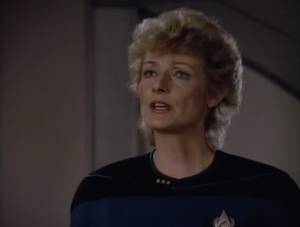 In “Pen Pals,” Pulaski is one of the biggest defenders of Data and his position, arguing that Data’s feelings for his friend are very important.
In “Pen Pals,” Pulaski is one of the biggest defenders of Data and his position, arguing that Data’s feelings for his friend are very important.
–
–
–
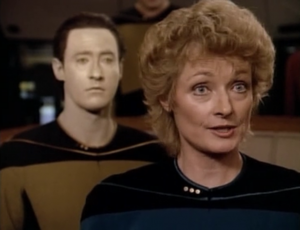 In “Peak Performance,” Pulaski has confidence in Data and pushes him to play a strategy game against a master. When Data loses his first match, Data believes he is somehow damaged because he didn’t win. Pulaski spends most of the episode trying to help Data regain his confidence.
In “Peak Performance,” Pulaski has confidence in Data and pushes him to play a strategy game against a master. When Data loses his first match, Data believes he is somehow damaged because he didn’t win. Pulaski spends most of the episode trying to help Data regain his confidence.
Hopefully I’ve already made my point, but let me spell it out. There’s probably less than ten minutes of Pulaski being legitimately mean to Data, and this is clearly something that she moves past as the season progresses. To say that this is Pulaski’s defining trait, or to hold this against her to the extent that some do, is unfair.
Now, to continue with the excruciating level of detail, here’s a quick run-down of Pulaski’s relationships with some of the other characters, both good and bad:
Her Relationship With Worf
At this point in the series, the entire crew pretty much avoids Worf like he has a disease. Up until Pulaski, everyone who interacted with Worf seemed more like they were there only to react to his lame Klingon one-liners.
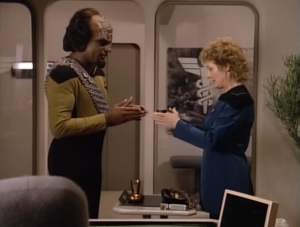 The best episode for the two of them is “Up the Long Ladder” where Pulaski protects Worf’s honor by keeping a secret. Because of Muldaur and Dorn’s performance this turned out to be a genuine moment between them. When Worf asks Pulaski to participate in the tea ceremony it seemed like the first time Worf acted like a Klingon that meant something beyond wanting to fight. In my opinion, Pulaski brought new light to Worf’s character, and it’s cool for a newcomer character like Pulaski to earn the respect of the meanest established character.
The best episode for the two of them is “Up the Long Ladder” where Pulaski protects Worf’s honor by keeping a secret. Because of Muldaur and Dorn’s performance this turned out to be a genuine moment between them. When Worf asks Pulaski to participate in the tea ceremony it seemed like the first time Worf acted like a Klingon that meant something beyond wanting to fight. In my opinion, Pulaski brought new light to Worf’s character, and it’s cool for a newcomer character like Pulaski to earn the respect of the meanest established character.
Her Relationship with Papa Riker
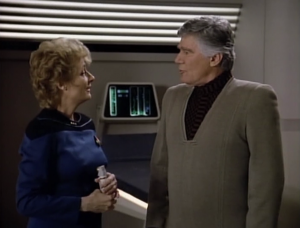 It was weird. No one’s perfect.
It was weird. No one’s perfect.
Her Relationship With Troi
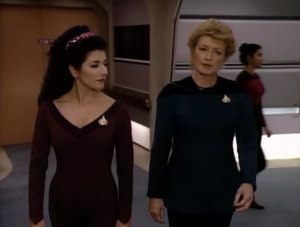 Probably her closest friend on Enterprise was Troi. Troi even started calling her “Kate”. They often tried to help each other, and made a good team when they worked together. Having said this, there was something about them that never seemed to click, despite the writers best efforts. In addition to that, Troi tries to be friends with everyone, so their friendship wasn’t exactly special. At the very least it gave us insights into Pulaski because she tended to show a more personal side when they were together.
Probably her closest friend on Enterprise was Troi. Troi even started calling her “Kate”. They often tried to help each other, and made a good team when they worked together. Having said this, there was something about them that never seemed to click, despite the writers best efforts. In addition to that, Troi tries to be friends with everyone, so their friendship wasn’t exactly special. At the very least it gave us insights into Pulaski because she tended to show a more personal side when they were together.
–
Conclusion
The average Trek fan’s opinion of Pulaski seems to be the product of some strange resentment that she replaced Crusher and over protective feelings toward Data. I think that anyone that comes to the second season with fresh eyes might feel differently. Honestly, the case for Pulaski is an easy one to make. To me, a lot of the Pulaski hate seems totally disconnected from what actually happens in the show. The best defense I can give of Pulaski is to tell people to re-watch the 2nd season of TNG and keep an open mind.

